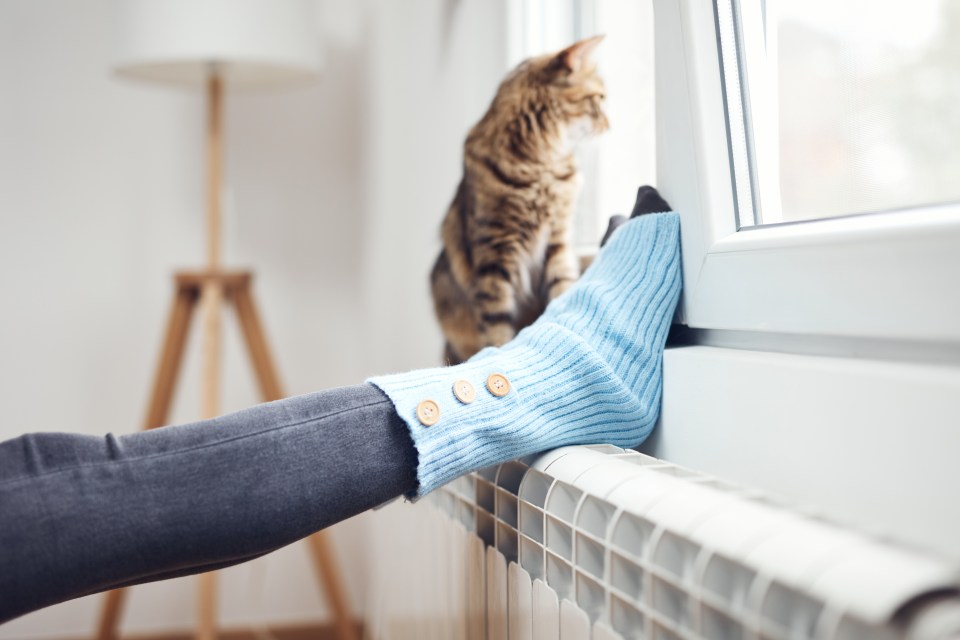WITH the weather growing colder and the days drawing in, you’re probably thinking about firing up your heating soon.
But before rushing to turn on the radiators when it gets chilly, there are a few things you should do to avoid facing some unnecessary bills this autumn and winter.
“There’s nothing worse than having your boiler break down when it’s freezing outside, so it’s worth taking care of your system,” says USwitch energy expert Ben Gallizzi.
The average cost of getting your boiler repaired is £300, according to Checkatrade, and £450 for an emergency repair.
Here are four steps you should take before turning on your heating, according to experts, that could save you hundreds of pounds.
1. DON’T put the heating on full blast
With energy bills still high, it can be tempting to hold out for as long as possible before blasting your radiators.
But turning on the heating in “short bursts” rather than putting it on full whack straight away is better for your appliances.
“Modern domestic boilers are designed to run at full capacity whenever the thermostat asks for it, so putting the heating on full blast won’t necessarily damage the appliance,” Mr Gallizzi told The Sun.
“Long periods of inactivity can hide problems, however, such as air in the radiators, low water pressure, sludge in the system or minor leaks.
“If you only discover these issues when the first cold snap hits and the boiler is running flat out, you can put the system under strain.
“So it’s worth easing the heating back in short bursts to check everything is working and give you a chance to spot issues before it’s too late,” he added.
2. Get your boiler serviced – and consider a ‘power flush’
Getting your boiler serviced every year can save you money on your energy bills in the long run as it keeps it running efficiently.
“An inefficient gas boiler can pile extra pounds onto your energy bill, as it’s likely to burn more fuel to produce the same amount of heat for your home,” Mr Gallizzi said.
“Over time, boilers can also build up deposits inside them that make them less efficient, and that’s why it’s important to have your boiler serviced every year.
“This will ensure your boiler is running efficiently and that it’s safe.”
According to Checkatrade, a boiler service costs on average between £80 and £120.
Mr Gallizzi suggests asking your engineering about a power flush while you’re at it.
This is essentially a deep clean of the pipes in your heating system, which can cut your energy bills as it makes the system work more efficiently.
“This can improve efficiency, as can installing an inhibitor to prevent sludge building up in your system in the first place,” he adds.
However, a power flush service is on the pricier side, and costs from £460 for a one-bed flat according to British Gas.
3. Set up heating controls
Simply turning your heating on as and when you feel cold may not be the most economical way to heat your home.
You run the risk of accidentally leaving the heating on for hours when you leave the house, or overheating your home.
Installing a thermostat and a timer can save you money on your energy bills and make sure your home stays at the right temperature.
A thermostat controls the temperature in your home, and will automatically turn your boiler off when your home reaches the level you’ve set it to.
According to the Energy Saving Trust, you should set your thermostat to between 18 and 21C – meaning your heating will turn off once your home reaches that temperature.
You can also set a timer to control when your heating and hot water comes on every day, so you’re not wasting energy when you’re not at home.
Many boilers come with thermostats and timers, and all new boilers installed in England from April 2018 must have both included.
If your boiler doesn’t have these, you can buy them at retailers such as Screwfix or B&Q, or have them installed by a heating company or your energy provider.
4. Bleed your radiators
Bleeding your radiators is one of the cheapest and quickest ways to get the most from your heating over the winter months.
Utility Warehouse chief commercial officer David Walter told The Sun: “Bleeding your radiators removes trapped air that prevents them from heating up properly.
“This simple task means your radiators operate more efficiently and provides consistent heat in your home.
“If you find a cold spot, or hear your radiators gurgle, that’s a sign to bleed them.”
You’ll need a radiator bleed key, which you can get for as little as 99p.
To bleed your radiators, first turn off the heating and let the radiators cool down to avoid any risk of burns or leaks.
Once cool, locate the bleed valve, which can usually be found at the top of the radiator.
Insert the key into the valve and turn it slowly anti-clockwise. You’ll hear a hissing sound as trapped air escapes.
Once water starts to drip out, turn the key clockwise to close the valve.
Do you have a money problem that needs sorting? Get in touch by emailing money-sm@news.co.uk.
Plus, you can join our Sun Money Chats and Tips Facebook group to share your tips and stories













